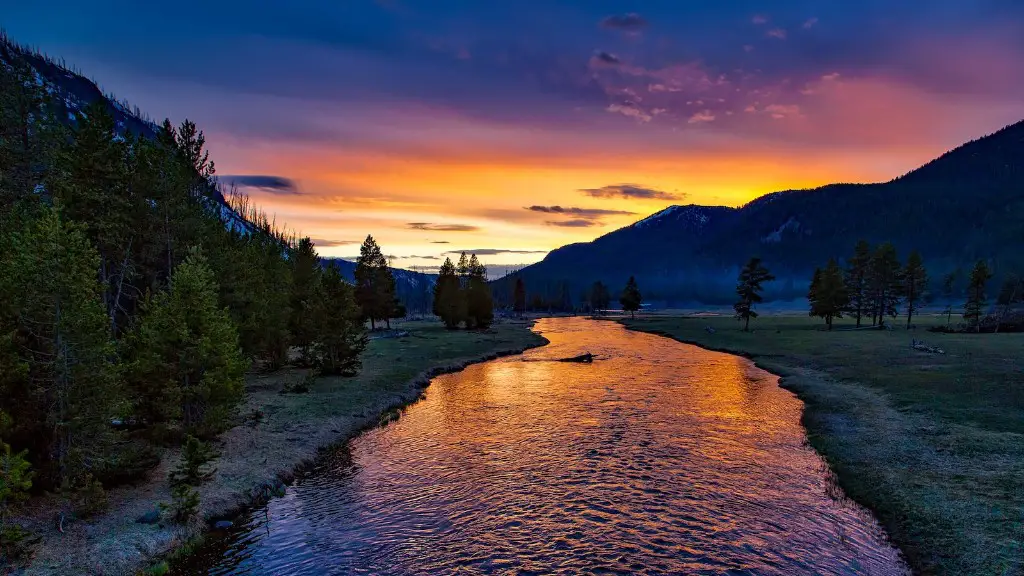Origins
The Mississippi River has been around for thousands of years, but the origin of its name is still a bit of a mystery. One popular theory is that the word “Mississippi” is derived from an Ojibwe word, “misi-ziibi,” which translates to “great river” or “gathering of the waters.” Another theory is that the name “Mississippi” comes from an Algonquin word, misiziibi, meaning “great river,” “big river”, or “long river”. While the source of the name may be unknown, its meaning is fairly clear: the name Mississippi is an affectionate nod to the river’s powerful and majestic size.
Early Explorers
The Mississippi River has been explored and studied by Europeans since the 1500s. In the early 1600s, French explorer Pierre Le Moyne d’Iberville was the first European to explore and map the Mississippi River. In the late 1600s, Louis Joliet and Jacques Marquette were the first Europeans to journey and map the entire length of the Mississippi River. Through their exploration of the Mississippi, they documented many of the river’s features including its waterfalls and rapids.
Modern Perspectives
Today, the Mississippi River is an important source of water, transportation, and recreation for the United States. It is home to thousands of species of birds, plants, and fish, many of which are endangered or threatened. Additionally, the Mississippi is a key economic driver for the region, providing transportation for commercial and recreational boats and contributing to the tourism industry. The Mississippi has also been used as a source of power for waterwheels and today, dams along the river are used to generate electricity.
Environmental Impact
Unfortunately, the Mississippi River has experienced significant environmental damage in recent years due to overfishing, pollution, and the introduction of invasive species. These environmental pressures have led to decreased populations of native species including threatened and endangered species of fish and birds. The U.S. Army Corps of Engineers has taken steps to protect the ecology of the Mississippi River, including the construction of locks and dams and the creation of flood control programs.
Popular Culture
The Mississippi River has been celebrated in popular culture for centuries, from early explorer’s tales to folklore of the Wild West. In modern day, the Mississippi is still celebrated in literature and film. Most famously, songs, stories, and movies have been created about legendary bluesman and guitarist Robert Johnson, who allegedly sold his soul to the Devil at the crossroads of the Mississippi.
Protection
In the wake of increasing environmental threats to the Mississippi, a number of initiatives have been put in place to protect the river and its wildlife. The Mississippi River Trust, a nonprofit dedicated to protecting and restoring the ecological integrity of the Mississippi, has taken on a number of protection initiatives, focused on restoring habitats, protecting watersheds, and ensuring sustainable water and agricultural use. Additionally, many states along the Mississippi have taken steps to reduce pollution, implement conservation strategies, and create wetlands restoration programs.
Effects & Legacy
The Mississippi River has a long and diverse history, from early exploration and mapping to modern day protection and preservation efforts. The river and its numerous tributaries provides a vital source of water and transportation for millions of people. Unfortunately, the health of the Mississippi continues to be threatened by pollution, overfishing, and the introduction of invasive species. Despite these threats, the Mississippi River remains one of the most vital ecological, economic, and cultural forces in the United States.
Projects
In recent years, numerous projects have been launched to improve the health and sustainability of the Mississippi River. The St. Paul District of the U.S. Army Corps of Engineers is currently undertaking a number of projects along the Mississippi River, including the construction of a navigation lock at Lock and Dam No. 4, just south of St. Paul, Minnesota. The goal of this project is to improve navigation, safety, and environmental sustainability on the Mississippi River. Additionally, the U.S. Army Corps of Engineers is working on restoring the wetlands and floodplains of the Mississippi, which provide important ecological benefits and help to filter contaminants from the river.
Restoration
Restoration projects have been implemented in multiple states along the Mississippi in order to improve the overall health of the Mississippi River and its numerous tributaries. In 2012, the Mississippi River Restoration Program was launched, funded by the federal government and administered by the Environmental Protection Agency (EPA). The goal of this program is to improve the water quality of the Mississippi and its tributaries, restore floodplains, and protect and restore habitats for fish, wildlife, and plants. The program develops and implements restoration projects in partnership with local and state organizations, such as the Nature Conservancy and the Mississippi State University Extension Service.
Legislation
The health of the Mississippi River is also impacted by federal and state legislation. In 2020, Congress passed the Clean Water Act Reauthorization and Improvement Act, which included provisions to improve water quality and aquatic habitat in the Mississippi watershed. Additionally, a number of states along the Mississippi, including Louisiana and Minnesota, have passed legislation to protect the river’s watersheds, reduce pollution, and improve water quality standards.
Educational Programs
Research and educational programs are also being implemented to increase public understanding and appreciation of the Mississippi River. The U.S. Army Corps of Engineers operates the Mississippi River Visitor’s Center in St. Louis, which collects and disseminates research and information about the ecology and history of the river. Additionally, several universities, including the University of Minnesota and Louisiana State University, have developed educational programs dedicated to the research and preservation of the Mississippi.


